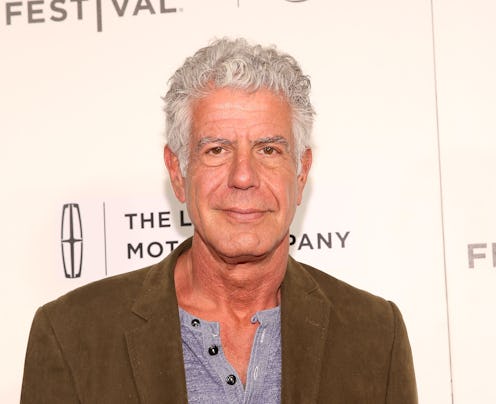Entertainment
Anthony Bourdain’s Support Of The #MeToo Movement Was So Much More Than A Hashtag

While there's a lot to remember about the groundbreaking chef and travel host in the wake of his death, here's one area in particular where no contributions should be overlooked: Anthony Bourdain's support of the #MeToo movement. The celebrity chef and host of Parts Unknown was a vocal advocate for the movement's advancement. In light of his recent death by suicide, the open-mindedness he showed as his opinions evolved on the issue of supporting women should be a lasting part of his legacy.
Activist Tarana Burke began the #MeToo movement over a decade ago, in 2007, but it really caught fire in October 2017, when accusations against Harvey Weinstein first surfaced, and survivors began to reclaim their voices. (Weinstein is currently facing rape charges in New York City, and has repeatedly denied all allegations of nonconsensual sex.) Italian actor and director Asia Argento was one of the first women to go on the record about the disgraced producer, and Bourdain was right there beside her from the beginning. After going public in February 2017, the pair had been officially dating for a little less than a year when Argento's words were published in the October 2017 New Yorker article detailing the allegations against Weinstein. (Weinstein denied the allegations in the article.)
But the length of their relationship did nothing to diminish the celebrity chef's support; when the article went live, Bourdain tweeted at his girlfriend, "I am proud and honored to know you. You just did the hardest thing in the world."
The next month, The Independent reports that Bourdain cooked Thanksgiving dinner for Argento and two other Weinstein accusers, Rose McGowan and Annabella Sciorra, and Los Angeles Times reporter Matt Pearce recalled on Twitter that the chef was the first person to tweet out their article exposing allegations against James Toback. (Thirty-eight women came forward to accuse the director of harassment, allegations which Toback denied.)
But while Bourdain was one of the earliest and loudest celebrities to throw his support behind the cause, he never seemed to want that credit. What was really impressive about the No Reservations star's advocacy is how open-minded it was; his natural curiosity meant that his awareness of different viewpoints was ever-expanding. Perhaps because of his constant exposure to new cultures, new locations, and new foods into his sixties, Bourdain was able to seamlessly absorb the #MeToo movement as well, rising to meet it like a challenge.
"I came out of a brutal, oppressive business that was historically unfriendly to women," Bourdain told The Daily Show's Trevor Noah in January, referring to the notoriously gender-biased culinary world. He continued:
"I look back, like I hope a lot of men in this industry [do], and I wonder, not so much, 'what did I do and not do?,' but 'what did I see and let slide?' 'What did I not notice?'"
For Bourdain, his inaction was a matter of ignorance, not apathy, and once his eyes were opened, there was a whole world of experiences to catch up on. As he told Noah:
"I knew a lot of women, it turned out, who had stories about their experiences—about people I knew—who did not feel I was the sort of person they could confide in. I started speaking about it out of a sense of real rage. I’d like to say that I was always enlightened in some way or I’m an activist or virtuous, but in fact, I have to be honest with myself. I met one extraordinary woman with an extraordinary and painful story, who introduced me to a lot of other women with extraordinary stories and suddenly it was personal."
Bourdain was a true ally to the #MeToo movement, because his rage was directed toward himself and his own complicity, instead of at the stories that were emerging or the survivors who were telling them.
In a rapidly changing world, Bourdain tackled his discomfort head-on, doing some extensive soul-searching. As he told Slate in an October 2017 interview, the chef found himself asking:
"Why was I not the sort of person, or why was I not seen as the sort of person, that these women could feel comfortable confiding in? I see this as a personal failing."
It's heart-wrenching to read about any situation in which Bourdain ascribes himself a "personal failing," particularly in light of his death, but this is a glimpse of what was so impressive about the late chef. He assessed his own responsibility and held himself accountable not only for his actions, but for his inactions. And he did it seamlessly, while also empathizing with survivors and publicly processing his regret that it had taken a direct connection to one of Weinstein's accusers to shift his awareness on the issue, so that others might learn from his example.
All in all, it paints a portrait of a man with a truly jaw-dropping level of empathy for those around him, which makes Bourdain's loss all the more devastating.
If you or someone you know are experiencing suicidal thoughts, call 911, or call the National Suicide Prevention Hotline at 1-800-273-8255 or text HOME to the Crisis Text Line at 741741. For international resources, here is a good place to begin.
If you or someone you know has been sexually assaulted, call the National Sexual Assault Telephone Hotline at 800-656-HOPE (4673) or visit online.rainn.org.